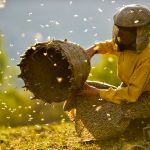The Sustainability Series is back, and you will be able to participate from home!
Watch HONEYLAND on Earth Day, April 22nd at 6:30 p.m.
Join us for a free virtual screening of HONEYLAND on Earth Day, Wednesday, April 22nd. We recommend you start the film at 6:30 p.m. More details below. Registration is required to receive screening link.
Join the Zoom Panel Discussion at 8:30 p.m.
Following our screening of the award winning documentary, we will offer a Zoom panel of local experts. Dr. Bekka Brodie (OU Biology), Environmental Studies students Jasmine Facun and Abbey Rodjom, and Sam Crowl (Office of Sustainability), to discuss the film and explore opportunities to assist bee populations locally and globally. Get your bee digs on and learn how to get involved!
Event Details:
Registration is required. Access to the film will become available to stream for registered patrons 24 hours in advance of the Zoom discussion. We suggest starting the film at 6:30 p.m. on Wednesday so it is fresh in your mind. The Zoom call begins at 8:30PM on Wednesday, though we recommend joining the call early to get properly acquainted with how Zoom works and test your connection.
Registry is now closed for the Honeyland screening.
About the film
Nestled in an isolated mountain region deep within the Balkans, Hatidze Muratova lives with her ailing mother in a village without roads, electricity or running water. She’s the last in a long line of Macedonian wild beekeepers, eking out a living farming honey in small batches to be sold in the closest city – a mere four hours’ walk away. Hatidze’s peaceful existence is thrown into upheaval by the arrival of an itinerant family, with their roaring engines, seven rambunctious children and herd of cattle. Hatidze optimistically meets the promise of change with an open heart, offering up her affections, her brandy and her tried-and-true beekeeping advice.
It doesn’t take long however, before Hussein, the itinerant family’s patriarch, senses opportunity and develops an interest in selling his own honey. Hussein has seven young mouths to feed and nowhere to graze his cattle, and he soon casts Hatidze’s advice aside in his hunt for profit. This causes a breach in the natural order that provokes a conflict with Hatidze that exposes the fundamental tension between nature and humanity, harmony and discord, exploitation and sustainability. Even as the family provides a much-needed respite from Hatidze’s isolation and loneliness, her very means of survival are threatened.


 85
85 
